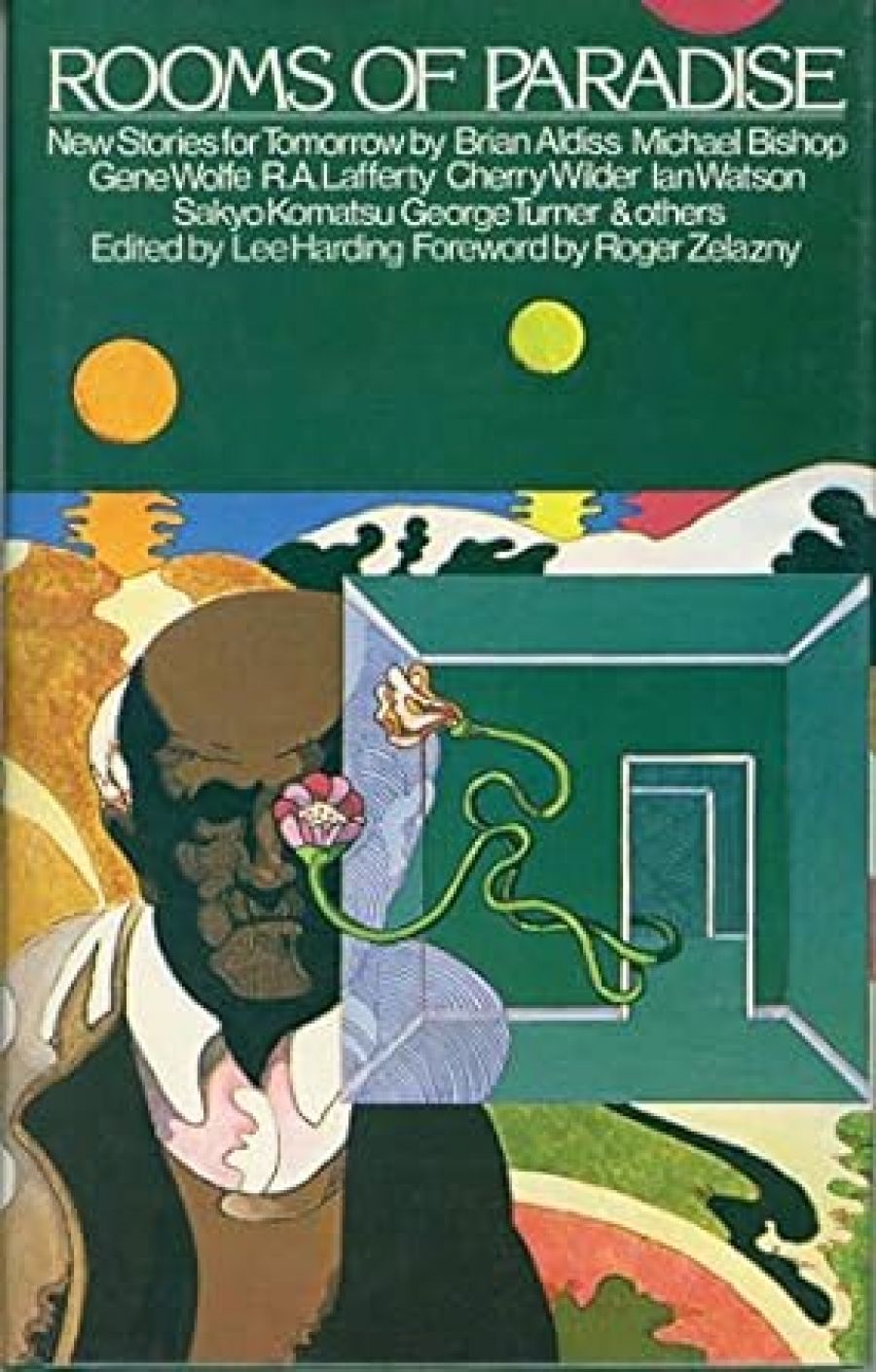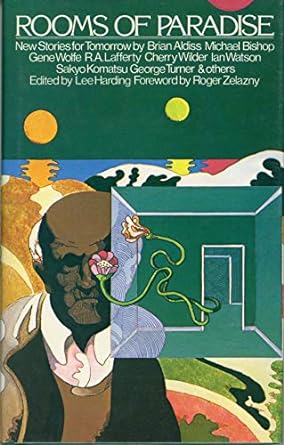
- Free Article: No
- Contents Category: Anthologies
- Review Article: Yes
- Online Only: No
- Custom Highlight Text:
Science-fiction short stories traditionally made their first appearance in American and British pulp magazines. The best stories then appeared in anthologies. In recent years more stories have been published for the first time in all-new anthologies, skipping the preliminary magazine stage. This in turn has led to the growth of science fiction publication in those countries, such as Australia, which do not have sufficient population to support specialist science fiction magazines of their own. Other Worlds and Rooms of Paradise are each all-new anthologies of science fiction. Rooms of Paradise is the more polished collection. Six of its twelve stories are by established overseas writers – including stars like Brian Aldiss and R.A. Lafferty – and the other six are by Australians. The local product is not overshadowed in this company; I think that in general the Australian stories are as well written and more original.
- Book 1 Title: Ron Graham Presents Other Worlds
- Book 1 Biblio: Void, 1978, 248 pp. $9.95 hb
- Book 2 Title: Rooms of Paradise
- Book 2 Biblio: Quartet Books, 1978, viii, 182 pp., $10.95 hb
- Book 2 Cover Small (400 x 600):

- Book 2 Cover (800 x 1200):

Reviewing anthologies, which of their nature contain diverse stories, is difficult. Among the more memorable stories was Cherry Wilder’s ‘The Falldown of Man’, in which an actor tells of the arrival of aliens – humans – on the planet Torin. Hearing that visitors have come from outer space, the actors dramatise the story and it becomes a very successful play. Indeed, it becomes so successful that they are called upon to perform it far beyond their usual territory, before an audience which includes the mysterious aliens themselves. Ms Wilder has thought out the background to the story very thoroughly. If an alien culture had acting troupes, how would their productions be staged? What relationships of jealousy and friendship would develop among the performers as the new production grows from rehearsal to success? How would they react to meeting the real aliens they have been portraying, and what would the aliens think of seeing themselves on stage? What would the actors think of Earth’s drama, and what idea of it would they be likely to get from the sorts of Earthlings who engage in space exploration? A happy, gentle, well worked-out story.
Michael Bishop provides a story jointly written by each of the two heads of a twohead man. It’s amusing, as you may have expected, but it’s also a touching and rather sad story. Philippa Maddern’s ‘Ignorant of Magic’ is a tour de force about conflicting world views. The plot, theme and style are so perfectly integrated that it is impossible to describe it briefly. The only way to understand what it’s about is to read it. In ‘Passage to Earth’, Damien Broderick gives us an intriguing glimpse of a Holistic Cybersystem Executive or spaceship, and its relationship with a girl who seems to be its daughter. George Turner has a fairly straight, and rather cynical, life-in-space story, ‘In a Petri Dish Upstairs’, which is as far from romantic space-opera as one can get. Dashing heroes with cleft chins and ultra-violet tanned faces are not what people who live up. there will be like. Ian Watson, in the title story, gives a haunting vision of the experience of having a body transplant. The most identifiably Australian story is Kevin McKay’s ‘Pie Row Joe’, a light sting-in-thetail yarn.
Other Worlds is less polished, but not for that reason less worthwhile. It contains sixteen stories and two groups of poems, all but five by Australians. Several of the writers have not been published before at all, and only a couple of them – Bertram Chandler, Wynne Whiteford – are really familiar. One disadvantage of the all-new anthology is that since it is not selected from stories which have already been found successful, it may include some out and out flops. Rooms of Paradise avoids his danger, but Other Worlds does not. Nevertheless, it contains some splendid successes as well. Jack Wortham’s ‘Jade Elm’ is a shattering story, told in the first person, of a sentient tree. Bertram Chandler contributes a marvelous yarn from an old space hand. Terence Green’s ‘The Night above the Dingle Starry’ is one of those scary stories in which paranoia is indeed merely the outlook of those who have just realized what’s happening. A couple of yarns try to integrate Aboriginal heritage with the science fiction form. Frank Bryning’s ‘Mechman of the Dreaming’ is probably the more successful.
Dimitri Kumashov’s ‘Blood and Wine’ is a story which could have been written or told anywhere, and would have delighted its audience. It has a gem-like timelessness, as has Margaret Flanagan Eicher’s fairy tale ‘Death and the King.’
Modern science fiction is not to be confused with the adolescent marvel-per-paragraph gunk which often filled the pages of pulp magazines forty years ago. These two collections will stand comparison with the best anthologies around today. Anyone interested in science fiction will want both of them; and anyone interested in current imaginative writing in Australia ought to want them too.


Comments powered by CComment